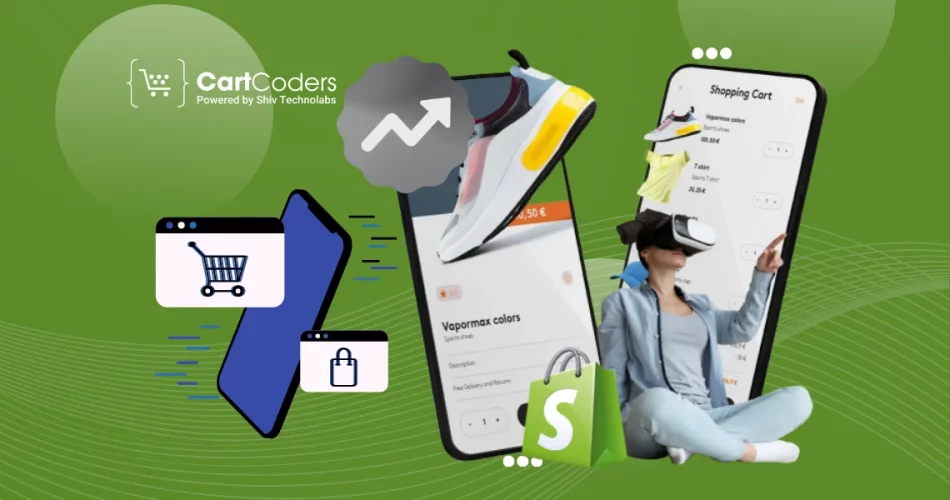Custom Engagement Solutions
Unlock tailored solutions with a free, no-obligation strategy session.
Expert Developers & Engineers on Demand
Scale Your Team with Skilled IT Professionals
Expert Guidance for Digital Transformation
Custom Engagement Solutions
Unlock tailored solutions with a free, no-obligation strategy session.
Expert Developers & Engineers on Demand
Scale Your Team with Skilled IT Professionals
Expert Guidance for Digital Transformation
Category
Shopify solutions for every industry!
We bring Shopify expertise to every industry—custom solutions, faster results!
Custom Engagement Solutions
Unlock tailored solutions with a free, no-obligation strategy session.
Expert Developers & Engineers on Demand
Scale Your Team with Skilled IT Professionals
Expert Guidance for Digital Transformation
Power Your Shopify Store with CartCoders Apps
Boost sales, drive traffic, and build loyalty with high-converting apps and top-rated support.
Data-Driven
Success Stories
See What We Built and How it Worked!
Latest Blogs & Insights
Shopify insights that keep you ahead.
Latest News & Announcements
Milestones that push our progress to new heights
Proud to Be Recognized as a Top eCommerce Workplace
Where Global Talent Meets Shopify Brilliance
 INDIA
INDIA
 contact@cartcoders.com
contact@cartcoders.com
7th Floor, PV Enclave, Opp. Courtyard by Marriott, Off Sindhu Bhavan Road, Bodakdev, Ahmedabad, Gujarat 380054
 USA
USA
 contact@cartcoders.com
contact@cartcoders.com
5119 E Coolbrook Ave, Scottsdale, AZ 85254
 CANADA
CANADA
 contact@cartcoders.com
contact@cartcoders.com
3120, Kirwin avenue Mississauga L5A3R2
 AUSTRALIA
AUSTRALIA
 contact@cartcoders.com
contact@cartcoders.com
2/23 Foster Street, Surry Hills, NSW 2010 Australia.
Get in Touch with Cartcoders
We’re Here to Help You Achieve Your Goals
Global Offices & Dev Hubs
 INDIA
INDIA
 contact@cartcoders.com
contact@cartcoders.com
7th Floor, PV Enclave, Opp. Courtyard by Marriott, Off Sindhu Bhavan Road, Bodakdev, Ahmedabad, Gujarat 380054
 USA
USA
 contact@cartcoders.com
contact@cartcoders.com
5119 E Coolbrook Ave, Scottsdale, AZ 85254
 CANADA
CANADA
 contact@cartcoders.com
contact@cartcoders.com
3120, Kirwin avenue, Mississauga L5A3R2
 AUSTRALIA
AUSTRALIA
 contact@cartcoders.com
contact@cartcoders.com
2/23 Foster Street, Surry Hills, NSW 2010 Australia.

Running an online store today is more than just listing products and waiting for orders. In 2025, success on Shopify comes down to the apps you use—and how you use them.
From automating support to keeping customers coming back, the right apps can do the heavy lifting for you. But with so many tools out there, it’s easy to get lost in the noise.Let’s cut through the clutter. Here are the most important Shopify app trends in 2025 that store owners are using—and seeing real results from.
From Shopify to custom apps, we develop powerful digital tools tailored to your business goals.


Remember when AI was just a nice-to-have? That’s over.
Now, AI runs in the background of everything—from product recommendations to customer support. Shopify’s tools like Magic and Sidekick help merchants write product descriptions, generate discount campaigns, and even answer basic questions.
But third-party apps take it a step further:
These tools aren’t just for enterprise brands. Small and mid-sized stores are using them to save time, reduce costs, and boost conversions without hiring more staff.
🛍️ Real-world example: One beauty brand using an AI chatbot saw a 35% drop in abandoned carts, just by answering questions instantly.
Must Read: How To Add AI And ML Capabilities To Your Shopify Store

Getting someone to buy once is great. Getting them to come back again and again? That’s where the money is.
In 2025, loyalty apps have evolved far beyond points and punch cards. Now they offer:
Some apps even plug directly into your SMS or email tool, turning repeat buyers into brand advocates without much effort.
🎯 If you’re not running a loyalty program yet, you’re leaving serious revenue on the table.
People don’t just visit your website anymore—they buy straight from Instagram, TikTok, and Facebook. Social commerce is booming, and smart Shopify apps make it easy to sell where your customers scroll.
What’s trending in 2025:
This isn’t just about brand awareness—it’s direct revenue.📱 Pro tip: Start with one platform your audience loves. Nail it. Then expand.
We build web, mobile, and backend systems that support growth across all major platforms.


Want predictable revenue? Offer something customers can subscribe to.
From coffee to cosmetics to pet supplies, more stores are offering monthly delivery or exclusive member perks. And today’s Shopify subscription apps are much easier to set up than they were even a year ago.
Here’s what’s possible:
💡 Think: What product do your buyers already repurchase regularly? That’s your subscription opportunity.

With every app you install, you add features—but possibly also friction. In 2025, performance is everything.
Shoppers expect your site to load in 2 seconds or less. And with Google’s search algorithms now factoring in speed, slow pages cost you visibility and sales.
That’s why store owners are:
⚙️ Don’t install 10 apps to solve one problem. Pick smarter tools, not just more tools.
You don’t need 50 apps to run a great Shopify store. You need the right 5.
Here’s a quick checklist to start with:
✅ An AI tool to save time (chatbot, description writer, email AI).
✅ A loyalty app to bring customers back.
✅ A social commerce app for the platform your buyers love.
✅ A subscription app (if your product fits).
✅ A performance check to keep things fast and clean.
At CartCoders, we don’t just build apps—we help Shopify merchants grow smarter.
Whether you want to:
—We’re here to help.📩 Contact us and let’s talk about how to make 2025 your best year on Shopify yet.
Categorized in:
As the CTO at Shiv Technolabs & CartCoders, I am liable for instigating, planning, integrating, and implementing the organization's strategic orientation. I gather the most significant tech news in addition to sharing the information I gained while serving as the CTO of Shiv Technolabs, a renowned web and mobile app development company. I am pleased to answer questions as a most valuable expert for Shiv Technolabs Private Limited and to share my experience. I offer a keen insider's perspective on technical advancements.
View All Articles
Projects delivered in 15+ industries.
95% retention rate, building lasting partnerships.


Serving clients across 25+ countries.
60+ pros | 10+ years of experience.
